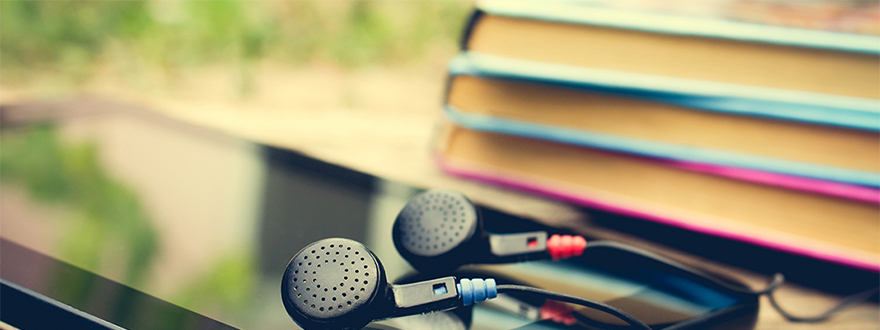The lesson was forced upon me. As a working mother, I couldn’t read like I wanted to read.
Awake by four-thirty or five, my day began with a mad rush to collect lunches and afterschool supplies. From eight to five, I was teaching and grading papers. From five to seven, I was carting kids around town. From seven until bedtime, I was making dinner, running the laundry, tying up loose ends. I barely had time to sleep, let alone sit down with a book.
But my soul felt like it was starving. In the evenings, I would hide in the bathtub, trying to squeeze in a few pages—minutes stretching into an hour as the water grew cold.
While cleaning the kitchen one day, I clicked on some YouTube readings. The quality wasn’t great, but I could at least get the information in my head. Thrilling. This had potential. From there, I transitioned to Librivox, then to an Audible subscription.
It was a strange move for someone with my priorities. Even though I have a graduate degree in oral literature—even though I know that the transfer of human ideas has its roots in the spoken tongue, I’d long continued to rank input quality by the prejudices of modernity.
Walter Ong’s Orality and Literacy, addresses the importance of auditory input:
“Sight isolates, sound incorporates. Whereas sight situates the observer outside what he views, at a distance, sound pours into the hearer. Vision dissects, as Merleau-Ponty has observed (1961). Vision comes to a human being from one direction at a time: to look at a room or a landscape, I must move my eyes around from one part to another. When I hear, however, I gather sound simultaneously from every directions at once; I am at the center of my auditory world, which envelopes me, establishing me at a kind of core of sensation and existence… You can immerse yourself in hearing, in sound. There is no way to immerse yourself similarly in sight.”
I don’t think Ong’s conclusion applies to all circumstances. As the mother of a colorblind child, it would be difficult for me to stomach an argument suggesting that my son needed a full range of spectrum to comprehend the world wholeheartedly. Those who juggle physical limitations have enough struggles without being told that they need what they cannot have. Because of this, I assume that God has a way of widening and deepening experience for those who have unique challenges. But for those who have the option to both see and hear, what can we discovered by the exercise of auditory input?
Today I was reading an article on The New York Times when I decided to select the same text and let the reader on my computer offer it to me aloud instead. For the sake of the point I’m making here, I should probably let you know that I’ve always scored high on reading comprehension tests. I’m a fast, strong reader, and my eyes are trained to look for key details. However, being able to harvest main ideas isn’t the same thing as being able to read perfectly.
As my computer’s voice reader kept the same pace throughout its delivery, I was forced to hear nuances that I had missed in my visual reading. Every sentence held equal weight, meaning the usual decisions I make (instinctively) about where to rush or rest my eyes inside of a block of text were stripped away. The conclusions I drew after listening were different from the conclusions I had drawn after reading.
As I have been slowly working through Les Mis over the past year, I’ve hit this same realization dozens of times. A few times, I have read a chapter on Kindle, read over the same chapter in a hard copy of the book, and then listened to George Guidall read it to me. Inevitably, the audio book has revealed information that I have missed in visual venues.
Especially in a book as complicated as Les Mis—a book full of diversions into history and culture—I tend to blitz paragraphs about French political leaders and bizarre nuances of monastic life. Yet, when those same sections are read aloud, I realize why Hugo included them.
It’s been humbling for me to discover that a venue I used to consider secondary can sometimes be superior to traditional reading. It’s also been liberating.
Lately, I have grown comfortable integrating audio books into my life as much as possible, playing them while I drive, clean, and exercise. I can tell that listening enhances reading and vice-versa. This ambidextrous approach allows me to work with my limitations in a spirit of gratitude instead of self-pity. My connection to great literature has not only been restored, but I am also able to learn in some ways that I wouldn’t have pursued if I hadn’t been forced to reach out beyond my own traditions.
If your life is too busy, and if you feel like you are withering away without your old long hours curled up with a physical book, I hope this post will encourage you to experiment a little. Actually, I find myself giggling a nowadays when stodgy old souls say things like, “Listening to a book isn’t READING it.” That’s bunk. For many decades, families sat before blazing fires listening to one another read aloud. For centuries before that, stories were passed from generation to generation by voice alone. Taking time to hear aligns you with some of the oldest and best traditions of human narrative. Stand expectantly on the cusp of your worn out, traditional reading map. Beyond this border be dragons—and this is not such a bad thing.
- To Young Mothers of Toddlers and Babies - April 19, 2021
- On Loneliness: A Letter to My Children - October 26, 2020
- The Summer of my Extroverted Child - August 12, 2019

Love this. Thanks, Rebecca.